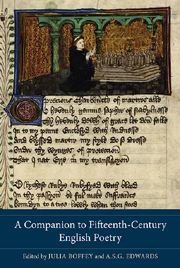Book contents
- Frontmatter
- Contents
- List of Contributors
- List of Abbreviations
- Conventions
- Introduction
- Part I Background and Context
- Part II Authors
- Part III Themes and Genres
- 11 Fifteenth-Century Chaucerian Visions
- 12 Historical and Political Verse
- 13 Classical and Humanist Translations
- 14 Romance
- 15 Scientific and Encyclopaedic Verse
- 16 Popular Verse Tales
- 17 Beyond the Fifteenth Century
- Chronology
- Index of Manuscripts
- General Index
13 - Classical and Humanist Translations
from Part III - Themes and Genres
Published online by Cambridge University Press: 05 July 2013
- Frontmatter
- Contents
- List of Contributors
- List of Abbreviations
- Conventions
- Introduction
- Part I Background and Context
- Part II Authors
- Part III Themes and Genres
- 11 Fifteenth-Century Chaucerian Visions
- 12 Historical and Political Verse
- 13 Classical and Humanist Translations
- 14 Romance
- 15 Scientific and Encyclopaedic Verse
- 16 Popular Verse Tales
- 17 Beyond the Fifteenth Century
- Chronology
- Index of Manuscripts
- General Index
Summary
yf thow fle ydelnes. Cupide hath no myght Ouidius de remedio hs bow lyeth broken. his fyre hath no lyght. amoris
(Robbins 1959: 560, n. 6; NIMEV 1430)There is no known English translation of Ovid's verse before some excerpts from his Ars amandi were printed as a textbook in Latin translation, The flores of Ouide de arte amandi, in 1513 (STC 18934). But on the back of a songbook of music and carols (Bodl. MS Arch. Selden. B. 26, fol. 33v) some fifteenth-century person wrote this couplet translating two lines from Ovid's Remedia amoris (lines 139–40). It is a teasing fragment to add to a small but intriguing set of fifteenth-century translations from Latin – whether the classical Latin of authors such as Ovid or the fine Latin of their humanist imitators – into English verse.
These verse translators comment on their purposes only fleetingly. But one illuminating comment comes at the end of the translation by Gilbert Banester (d.1487) of a story from Boccaccio's Il Decamerone (NIMEV 4082). Like many fifteenth-century poets he addresses his little book, echoing Chaucer in Troilus and Criseyde (V.1786–99), but amid the conventions he describes his project precisely:
Prey all tho, theras thou comyst in audiens,
To haue piete on thy symple translacione,
Oute off prose by myne vnkonnyng directioune
Made in balade […]
Besekyng all the maisters of this science
Me holde excused, for goode ys myne entencion,
Thogh I florysh nat with metyr and cadence,
Off rethoryk and poetry makyng mencioune;
Such clerkly werkys passith my discrecion.
(Banester, ed. Wright 1937: 36, lines 612–21)- Type
- Chapter
- Information
- A Companion to Fifteenth-Century English Poetry , pp. 171 - 186Publisher: Boydell & BrewerPrint publication year: 2013



